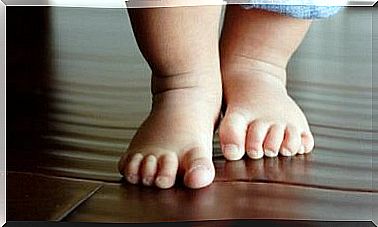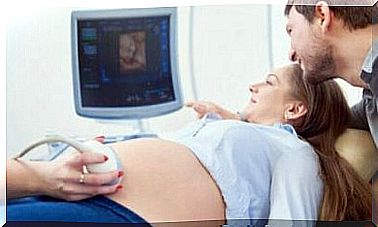Thyroid Problems And Pregnancy: Symptoms And Possible Consequences

The thyroid gland perform many important functions in our bodies. Pregnancy puts extra demand on this gland, which can result in the appearance of thyroid problems for mother and baby.
The function of the thyroid gland is to produce triiodothyronine (T3) and thyroxine (T4). These two very important hormones regulate metabolism and body temperature. They also contribute to the brain, heart and muscles, as well as other things related to fertility and reproduction in women.
After conception, this small gland, located just below the Adam’s apple, has to work overtime. The thyroid gland is forced to increase its production of thyroxine. This is because some of the hormone is transferred to the fetus until the baby produces its own.
In other words, the thyroid gland can produce enough hormones for both mother and baby. There are also other connections between pregnancy and the thyroid gland. Keep reading to find out more.
The T4 hormone is responsible for processing the nutrients you eat and turning them into energy. But it is also one of the hormones that contribute to the formation of the placenta.
Since the fetus does not develop its own thyroid gland by the 12th week of pregnancy, the mother must supply the necessary hormones for both her and the baby.
Thyroid and pregnancy
During pregnancy, the production of T3 increases by approx. 30%, while the production of T4 increases by approx. 50%.
The chorionic gonadotropin hormone, which is shown in pregnancy tests, is responsible for causing stimulation of the thyroid gland. From the second trimester of pregnancy onwards, estrogen also changes the production of this hormone.
Changes in the thyroid gland before pregnancy, as well as those that appear during pregnancy, can cause problems during pregnancy.
Hypothyroidism during pregnancy
When the thyroid gland does not produce a sufficient amount of thyroxine to meet the demands of pregnancy, it is called hypothyroidism.
In this case , a medical professional usually prescribes medication to the expectant mother, to compensate for the deficiency.
A pregnant woman who experiences this deficiency can also increase her iodine intake by adding iodized salt to her diet. Iodized salt increases the production of hormones.

The following symptoms are an indication that you may be dealing with hypothyroidism:
- Fatigue
- Weakness
- Weight gain
- Constipation
- Muscle and joint pain
- Dry skin
- Weakening of skin and nails
The combination of hypothyroidism and pregnancy can result in the fetus developing a goiter or thyroid tumor – after the growth of its own thyroid gland. But goiter just disappears the day after the baby is born.
Hypothyroidism becomes dangerous during pregnancy when not treated in time (before the third trimester). A woman with untreated hypothyroidism runs the risk of miscarriage, premature birth, hypertension and preeclampsia.
Hyperthyroidism during pregnancy
The opposite of hypothyroidism is hyperthyroidism. Hyperthyroidism during pregnancy refers to a production of hormones by the thyroid gland that exceed the amount required for pregnancy.
The proportion of women who suffer from hyperthyriodism during pregnancy is very low – only approx. 2 out of every 1000 women.
What are the symptoms that indicate the possible existence of hyperthyriodism during pregnancy? Here is a list of the most common characters:
- Tachycardia
- Weight loss
- Rysten
- Irregular bowel function
- Heat intolerance
- Emotional weakness
- Cold, clingy skin
- Growth of the thyroid gland

Treatment of hyperthyroidism during pregnancy includes antithyroid medication. This medication works to normalize hormone levels, both for the mother and the baby.
If hyperthyroidism is left untreated, it can cause miscarriage, fetal tachycardia, low birth weight or fetal death.
Hyporthyroidism can also be harmful to the mother. The most common consequences are:
- Thyroid storm: A thyroid storm refers to the worsening of symptoms of hyporthyroidism. It is caused by stress, severe infection, induced anesthesia, abstinence from antithyroid medication or after iodine treatment.
- Pre-campus: Pre-campis is a complication that results in reduced blood circulation to the mother’s organs. The affected organs include the kidneys, brain and also the placenta. In addition, preeclampsia poses a risk to the life of the unborn child.
Prevention of thyroid-related complications during pregnancy
The early detection of these conditions is very important. Early detection is the most effective way to prevent complications.
A family medical history of thyroid or unhealthy habits are factors that should be considered.
Usually, when a woman manifests the urge to get pregnant or a thyroid problem is discovered, her doctor will perform a series of checks. This will include blood tests that measure her hormone levels.
The consequences of an overactive or underactive thyroid gland during pregnancy can be very serious. But there is no need to worry, as hyporthyroidism and hyperthyroidism are both easy to diagnose as well as easy to treat.









